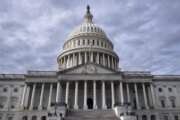WARSAW, Poland (AP) — Polish police on Tuesday arrested two politicians convicted of abuse of power who had taken refuge for hours in the palace of President Andrzej Duda, in a dramatic escalation of a standoff between the new and previous governments.
Duda welcomed the members of the former ruling party into the presidential palace as police went to their homes to arrest them. Polish media reported the men were arrested inside the palace. Warsaw police gave no details, saying only that the arrest was “in accordance with the court order.”
The events escalated a dispute between the new government, led by Prime Minister Donald Tusk, and the conservative Law and Justice party that governed Poland for eight years until last month following its defeat in a general election in October.
Duda is closely aligned with Law and Justice and is making it clear that he will oppose Tusk’s agenda. Duda’s second and final term runs until mid-2025.
Tusk, who has promised to restore democratic norms in Poland, accused the president of going along with actions by Law and Justice to create chaos and instability after its electoral defeat, saying that Duda “must stop this spectacle, which is leading to a very dangerous situation.”
The prime minister claimed that the president was obstructing justice by giving the wanted men refuge. At a news conference, he read out a section of the penal code that he alleged Duda had violated, which carries a prison term from three months to five years.
“I just want the president to be aware of what his political friends have tricked him into,” Tusk said.
The dispute centers on two senior members of Law and Justice, former Interior Minister Mariusz Kaminski and his former deputy Maciej Wasik, who came out of the palace briefly to speak to journalists hours before their arrest.
“We are not hiding,” Kaminski said. “We are currently with the president of the Republic of Poland until evil loses.”
Kaminski and Wasik were convicted of abuse of power for actions taken in 2007, when they served in an earlier Law and Justice-led government. Duda in 2015 pardoned them, though legal experts argued that such pardons are reserved for cases that have gone through all appeals.
In June, Poland’s Supreme Court overturned the pardons and ordered a retrial. Kaminski and Wasik were sentenced in December to two years in prison. A court on Monday issued orders for police to arrest them and deliver them to prison. They insist that they are innocent, and Duda argues that the pardons remain valid.
On Tuesday, Duda invited Kaminski and Wasik to his palace for a ceremony where he appointed two officials who had worked for them as his new advisers. His office posted a photo of him posing with all four.
Earilier in the day, parliamentary speaker, Szymon Holownia, postponed a planned session of the Sejm, the lower house of parliament, which had been scheduled to start on Wednesday, until next week.
Kaminski and Wasik, who were reelected as lawmakers in October, had said they wanted to take part in the session, even though Holownia and others insist that, under the law, their guilty sentences strip them of their parliamentary mandates.
Holownia said the situation had created a “deep constitutional crisis … that does not guarantee that the Sejm’s deliberations this week would be peaceful.”
Kaminski is a former head of the Central Anticorruption Bureau who was convicted along with Wasik and two others of abusing their power for creating a provocation in a sting operation seeking to frame their targets. That scandal contributed to the collapse of Law and Justice’s first government in 2007.
Tusk’s allies welcomed the arrests, saying they marked a return to officials being held accountable. “Let this be a warning to politicians for the next generation,” Foreign Minister Radek Sikorski posted on social media.
Former prime minister Mateusz Morawiecki was among Law and Justice officials who voiced outrage, describing the arrested men as “political prisoners.”
Copyright © 2024 The Associated Press. All rights reserved. This material may not be published, broadcast, written or redistributed.






